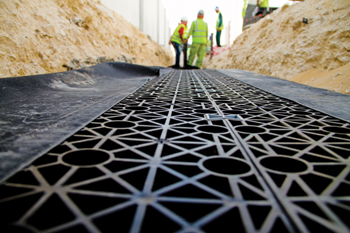Polypipe scores with quality green solutions
ADAM TURK, commercial director of Polypipe* and member of UK Trade and Investment’s (UKTI) High Value Opportunities board, looks at the contributions UK manufacturers are making to construction in the Gulf, and the benefits of buying British.
01 June 2014
British-made products have long been synonymous with quality and reliability. The British and EU standards with which manufacturers must comply are among the most stringent in the world, giving customers confidence in the robustness of the products they specify.
When selecting British products, quality comes backed by expert technical capability and long-term investment in innovation. For example, Polypipe’s own UKAS-accredited test laboratory can be configured to replicate any climate worldwide, assessing the performance of Polypipe products in Middle Eastern conditions and providing vital data for its in-house product designers and construction partners alike.
 |
|
|
It is this focus on providing solutions rather than just products that makes British manufacturers trusted partners to constructors in the Middle East and worldwide. Using a combination of local knowledge and experience together with their technical capabilities, testing facilities and system design expertise, UK manufacturers can be relied upon to assist contractors at every stage of the planning, design, installation and maintenance process.
Typifying this approach, Polypipe’s own track record of client partnerships has led to its selection as both a scientific partner and supplier to prestigious projects in the Middle East, including the groundbreaking Qatar case study Passivhaus ‘Baytna’ sustainable villa project.
Working closely with Qatar Green Building Council (QGBC) and Barwa Real Estate (BRE), Polypipe was the only British manufacturer involved in the project and recommended the use of several of its water management systems for water drainage, capture and reuse, and the supply of hot and cold water around the building. Quick and easy to install, Polypipe’s solutions for the Passivhaus project provided the water conservation and sub-surface irrigation required – and thanks to advanced product testing, the team could be sure that the British-made, quality products will withstand the Middle Eastern climate.
Crucial to Polypipe’s involvement in the Passivhaus project was its commitment to sustainability. The British construction industry is today held to very high sustainability standards, meaning that manufacturers supplying the sector have had to rise to the challenge and develop new solutions to improve the ‘green’ credentials of the built environment.
.jpg) |
|
Turk ... quality focus. |
As a company which develops water management systems, sustainability is naturally high on Polypipe’s agenda, with a variety of solutions available to enable water conservation and reuse. The responsible use of such a precious resource is understandably crucial to Middle East developers, who can be assured that working with British manufacturers will enable them to meet and exceed environmental targets, both during construction and throughout the lifetime of a new building.
The materials Polypipe uses are in themselves environment-friendly, while manufacturing processes are both energy efficient and have a minimal environmental impact. Energy usage is reduced as plastic pipes are lightweight, making them easier to transport and, in contrast to many traditional materials, plastics are recyclable.
Rapid urbanisation of many parts of the region means that developers must be resourceful in all aspects of energy and water consumption, planning around geographical features such as high water tables which can result in flash flooding after storms, and also allowing for future growth. To ensure that maximum water savings are achieved, water conservation and management should be incorporated into the design of all new buildings and infrastructure.
Despite far lower annual rainfall, water use in the Middle East is far higher than in other nations such as the UK. Current methods of topping up freshwater supplies, such as desalination, are generally seen as too expensive and inefficient to be long-term solutions, meaning that water management and conservation is being considered much earlier in the planning process.
Established in the Gulf region for more than 50 years, Polypipe has developed its water management solutions for the Middle East region as a trusted partner to local governing bodies and contractors.
 |
|
Polypipe was the only British manufacturer involved in the Passivhaus ‘Baytna’ sustainable villa pro-ject. |
Other notable projects in the region include Bin Twar Mall, College of Media and Communication and MKH Office Tower, all in Qatar, as well as several upcoming transport infrastructure developments. Using a combination of a dedicated local team together with the UK’s technical capabilities, testing facilities and system design expertise, Polypipe experts work closely with local contractors, consultants and municipalities, as well as their research and development colleagues in the UK to create solutions that are ideally suited to the region’s climate.
It’s clear that in today’s construction industry, the partnership between Middle Eastern contractors and British manufacturers does not begin and end with product supply.
*Polypipe, recently floated on the London Stock Exchange, has also been selected as an ambassador company for UKTI, fronting a campaign which aims to connect British manufacturers with construction companies in the Middle East and beyond for mutual benefit.
- Region has lot to offer UK firms
- Arup blends local, global knowledge
- Polypipe scores with quality green solutions
- Hitachi to showcase machines at expo



